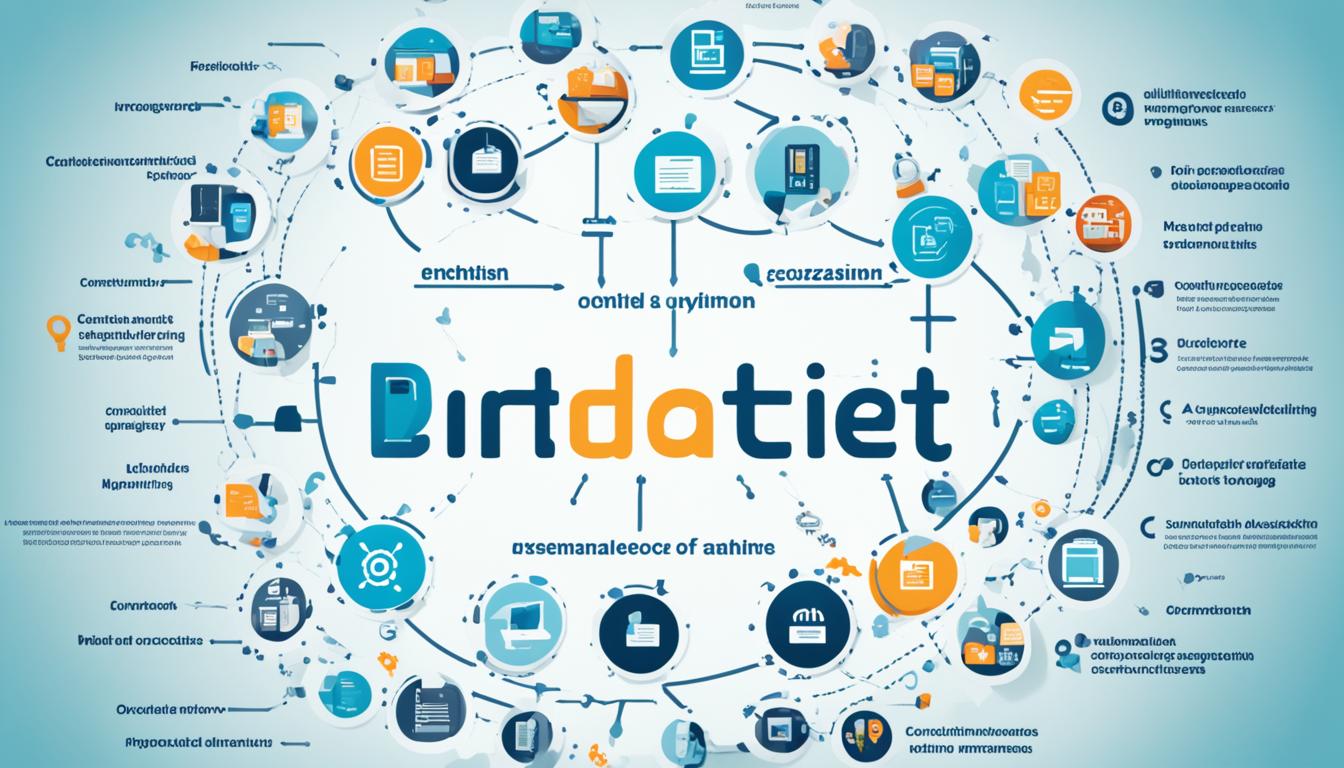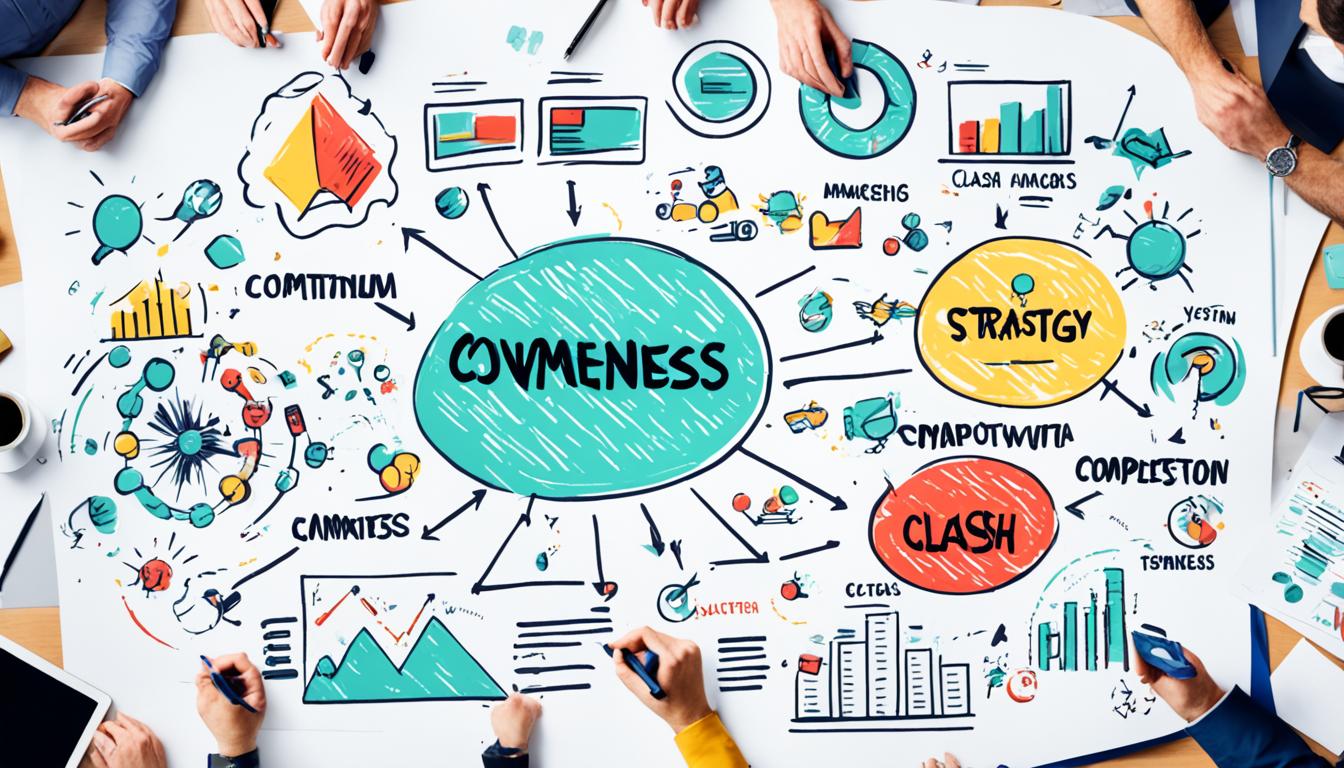When considering a career in business, two areas that often come up are marketing and human resources (HR). Both fields offer numerous opportunities and require a combination of psychology and economics. In this comprehensive guide, we will compare the job descriptions, important skills, and how to choose between marketing and HR based on research and advice from professionals in both careers.
Key Takeaways:
- Marketing and HR are distinct yet crucial functions within organizations.
- Marketing focuses on promoting products and brands to external audiences, while HR focuses on managing employees and internal operations.
- Both fields require specific skills and strategies for success.
- Individuals should consider their interests, career goals, and preferences when choosing between marketing and HR.
- By understanding the job descriptions, skill requirements, benefits, and strategic approaches in marketing and HR, individuals can make informed decisions and embark on a rewarding career path.
Marketing vs. Human Resources: Job Descriptions
When it comes to job descriptions, marketing and human resources (HR) have distinct roles and responsibilities within an organization. Let’s explore the job descriptions of both fields to understand their core focus and objectives.
Marketing Job Description
Marketers are responsible for promoting their company’s products or services to target audiences. They develop and implement marketing strategies to enhance brand awareness, drive sales, and attract and engage customers. Some key job responsibilities in marketing include:
- Creating and executing marketing campaigns
- Conducting market research and analyzing consumer behavior
- Developing and managing digital and print marketing channels
- Creating content for advertising and promotional materials
- Monitoring and analyzing marketing performance metrics
- Collaborating with cross-functional teams to align marketing efforts with business objectives
Marketing professionals play a crucial role in brand promotion and revenue generation through effective marketing strategies.
Human Resources Job Description
Human resources professionals are primarily focused on managing the internal operations and employees of an organization. They ensure that the workforce is managed efficiently and effectively throughout the employee lifecycle. Some key job responsibilities in HR include:
- Recruiting and selecting qualified candidates
- Managing employee onboarding and offboarding processes
- Developing and implementing HR policies and procedures
- Administering employee benefits and payroll
- Handling employee relations and conflict resolution
- Developing and conducting employee training and development programs
HR professionals play a crucial role in maintaining employee satisfaction, managing organizational culture, and ensuring legal compliance.
While there may be some overlap in job responsibilities, the core focus and objectives differ between marketing and HR. Marketers concentrate on promoting the company and enhancing brand awareness, while HR professionals concentrate on managing employees and improving internal operations.
Important Skills in Marketing and Human Resources
Both marketing and HR professionals require a unique set of skills to excel in their respective roles. While marketing skills focus on promoting products or services and attracting customers, HR skills revolve around managing and supporting employees within an organization.
Marketing Skills
- Sales: Mastering the art of selling is essential for marketing professionals to drive revenue and achieve business objectives.
- Budgeting: Effective budget management ensures that marketing campaigns are executed efficiently and cost-effectively.
- Social Media: Proficiency in social media platforms allows marketers to leverage these channels for brand promotion and engaging with target audiences.
- Project Management: Organizing and overseeing marketing initiatives requires strong project management skills to meet deadlines and deliver results.
- Digital Marketing: Understanding digital channels and strategies is crucial in today’s technology-driven marketing landscape.
- Marketing Strategy: Developing comprehensive marketing strategies helps align business goals with customer needs and preferences.
- Market Research: Conducting thorough market research enables marketers to gain insights into consumer behavior and identify opportunities.
- Customer Service: Providing exceptional customer service fosters loyalty and enhances the overall customer experience.
HR Skills
- Employee Relations: Building and maintaining positive relationships with employees promotes a harmonious work environment.
- Performance Management: Evaluating employee performance and providing constructive feedback is crucial for continuous improvement and goal attainment.
- Onboarding: Effectively onboarding new hires ensures a smooth transition and facilitates their integration into the organization.
- HR Information Systems (HRIS): Proficiency in HRIS platforms enables efficient management and analysis of employee data and HR processes.
- Talent Acquisition: Identifying and attracting top talent through strategic sourcing and recruitment methods ensures a skilled and diverse workforce.
- Staff Management: Effectively managing employee schedules, workload, and performance promotes productivity and team collaboration.
- Legal Compliance: Staying informed and compliant with employment laws and regulations is essential for HR professionals to avoid legal issues.
- Budgeting: HR professionals must have a solid understanding of financial management to develop and manage HR budgets effectively.
These skills enable professionals in both marketing and HR to make informed decisions, build strong relationships, and drive organizational success. The combination of these skills with industry knowledge and experience forms the foundation for excelling in their respective fields.
Marketing vs. Human Resources: How to Choose?
When it comes to choosing a career path, deciding between marketing and human resources (HR) can be a challenging task. Both fields offer unique opportunities and require specific skill sets. To help you make an informed decision, here are some factors to consider:
External vs. Internal Focus
One important consideration is whether you prefer an external or internal focus in your work. Marketing professionals are typically responsible for reaching and engaging external audiences, promoting products or services, and driving sales. On the other hand, HR professionals primarily focus on internal operations and employee management, ensuring smooth processes, and fostering a positive work environment.
Structure and Routine
Another aspect to think about is the level of structure and routine you prefer in your work. Marketing often involves constant adaptation to new trends, experimenting with different strategies, and staying ahead in a dynamic environment. On the other hand, HR tends to have more established processes and procedures, providing a sense of stability and predictability in daily tasks.
Career Paths
Consider the potential career paths in marketing and HR. In marketing, you can pursue career opportunities in various industries, such as advertising, digital marketing, brand management, or market research. In HR, career paths can lead to roles in talent acquisition, employee relations, training and development, or HR management. Researching the different career trajectories and growth opportunities in each field can help you align your career goals.
Skills Comparison
Assessing your skills and comparing them to the requirements of both marketing and HR roles is crucial. Marketing professionals often need skills in areas such as sales, digital marketing, social media management, market research, and strategic planning. On the other hand, HR professionals should possess skills in employee relations, talent management, performance management, legal compliance, and HR information systems (HRIS).
By evaluating your interests, considering the external vs. internal focus, the structure, routine, career paths, and skills required in marketing and HR, you will be better equipped to choose the career path that aligns with your aspirations and goals.
Exploring the different aspects of marketing and human resources can help you make an informed decision about your career path. Whether you thrive in an external marketing role or find fulfillment in internal HR operations, understanding your preferences and skills is essential in choosing the right path for you.
Benefits of Marketing and Human Resources
Both marketing and HR offer numerous benefits to individuals and organizations. In the field of marketing, professionals have the opportunity to promote brands, influence consumer behavior, and drive business growth. By utilizing effective marketing strategies, companies can enhance their brand promotion efforts, resulting in increased visibility and market share.
On the other hand, HR professionals play a crucial role in employee management, fostering a positive workplace culture, and ensuring employee satisfaction and retention. They are responsible for various aspects of employee management, such as recruitment, onboarding, performance management, and talent development. By prioritizing HR practices, organizations can create a conducive work environment that promotes employee engagement, productivity, and loyalty.
Some specific benefits of a marketing career include:
- Strong Employer Branding: By effectively marketing the company’s values, culture, and opportunities, organizations can establish a strong employer brand that attracts top talent and enhances their reputation in the industry.
- Enhanced Candidate Experience: Through strategic marketing efforts, companies can provide candidates with a seamless and engaging experience throughout the recruitment process, creating a positive impression of the organization.
- Improved Brand Promotion: Marketing professionals have the skills and knowledge to develop and implement effective brand promotion strategies, raising awareness and generating interest in the company’s products or services.
On the other hand, the benefits of a career in HR include:
- Improved Employee Retention: HR professionals focus on creating a positive work environment, fostering employee satisfaction, and implementing retention strategies that help organizations retain top talent and reduce turnover.
- Talent Management: HR plays a crucial role in identifying, attracting, and developing talent within the organization. Effective talent management strategies ensure that companies have the right people in the right roles to drive success.
Examples of Benefits
| Marketing | Human Resources |
|---|---|
| Strong employer branding | Improved employee retention |
| Enhanced candidate experience | Talent management |
| Improved brand promotion |
As the table above illustrates, marketing and HR have different benefits that contribute to the overall success and growth of an organization. While marketing focuses on brand promotion and consumer engagement, HR plays a vital role in employee management and talent development.
Internal vs. External Human Resources
Organizations have the option to either have an internal HR department or outsource certain HR functions to external HR teams.
Internal HR departments handle all HR-related activities internally, including strategic HR management, payroll, and benefits administration.
On the other hand, external HR teams provide specialized HR services on a contractual basis, allowing organizations to access HR expertise and resources without the need for an in-house team.
Each approach has its pros and cons, and organizations should consider factors such as cost, expertise, and specific HR needs when deciding between internal and external HR solutions.
Pros and Cons of Internal HR
Internal HR departments offer several advantages, such as:
- Direct control and oversight of HR functions
- Deep knowledge of the organization’s culture and values
- Ability to align HR strategies with business goals
However, there are also potential drawbacks to having an internal HR department:
- Higher costs associated with maintaining a dedicated HR team
- Limited access to specialized HR expertise
- Potential for bias or conflicts of interest
Benefits of External HR
Outsourcing HR functions to external HR teams offers several benefits, including:
- Access to specialized HR knowledge and resources
- Cost savings compared to maintaining an internal HR department
- Flexibility to scale HR services based on organizational needs
However, there are also potential drawbacks to outsourcing HR:
- Less control and oversight over HR activities
- Potential communication and coordination challenges
- Dependency on external providers for critical HR functions
Strategic HR Management
Regardless of whether an organization chooses internal or external HR, strategic HR management is essential for driving business success.
It involves aligning HR practices with overall organizational strategy and goals, focusing on attracting, developing, and retaining top talent.
Strategic HR management includes activities such as talent acquisition, performance management, employee development, and succession planning.
Payroll and Benefits Administration
In both internal and external HR setups, payroll and benefits administration are critical functions that ensure employees are compensated accurately and receive the necessary benefits.
This includes activities such as processing payroll, managing employee benefits programs, and ensuring compliance with legal and regulatory requirements.
| Internal HR Department | External HR Team |
|---|---|
|
|
|
|
HR Marketing: A Strategic Approach
HR marketing is defined as the strategic approach of attracting, motivating, and retaining top talent within an organization. It encompasses a range of activities aimed at building a strong employer brand, promoting recruitment efforts, and marketing training programs. To execute effective HR marketing, it is essential to segment the target audience, employ an effortless marketing approach that captivates candidates, and maintain consistency in marketing efforts to establish brand recognition and preference among potential employees.
Key Strategies in HR Marketing
HR marketing strategies play a vital role in enhancing an organization’s ability to attract and retain top talent. These strategies include:
- Employer Branding: Building a strong employer brand by showcasing the organization’s values, culture, and unique offerings to attract potential candidates.
- Recruitment Marketing: Developing targeted campaigns and initiatives to attract qualified candidates and create a positive candidate experience throughout the recruitment process.
- Training Program Marketing: Promoting training and development opportunities within the organization to attract and retain employees who value professional growth.
Segmenting the Target Audience
Segmenting the target audience is a critical aspect of HR marketing. By understanding the different needs, preferences, and characteristics of potential candidates, HR professionals can tailor their marketing efforts to effectively reach and engage them. This segmentation can be based on factors such as job roles, experience levels, industry preferences, and geographic locations.
The Effortless Marketing Approach
An effortless marketing approach in HR marketing involves making the candidate experience smooth and frictionless. This can be achieved by simplifying application processes, providing clear and concise information about job opportunities, and actively engaging with candidates throughout the recruitment process. An effortless marketing approach creates a positive impression and enhances the likelihood of attracting high-quality candidates.
Consistency in HR Marketing
Consistency is crucial in HR marketing to establish brand recognition and preference in the minds of potential employees. By maintaining consistent messaging, visual identity, and a cohesive employer brand across various communication channels, organizations can create a strong and memorable impression. Consistency also fosters trust and familiarity, making candidates more likely to choose the organization as their employer of choice.
| Key Benefits of HR Marketing |
|---|
| Attracts top talent |
| Enhances employer branding |
| Improves candidate experience |
| Aids in employee retention |
Effective HR marketing strategies have a direct impact on an organization’s ability to attract the right talent, establish a strong employer brand, provide a positive candidate experience, and improve employee retention rates. By adopting a strategic approach and leveraging key HR marketing strategies such as employer branding, recruitment marketing, and training program marketing, organizations can gain a competitive edge in the talent market.

Importance of HR Marketing
HR marketing plays a crucial role in establishing a strong connection between employees and organizations. Through effective HR marketing strategies, companies can create an emotional attachment, align employees with organizational goals, and promote employee advocacy. This has a significant impact on the overall success of the organization.
One of the key benefits of HR marketing is the development of a strong employer-employee relationship. By effectively communicating the organization’s mission, values, and culture, HR marketing helps employees feel connected, engaged, and valued. This leads to higher job satisfaction and productivity, as well as increased loyalty and commitment towards the organization.
Another important aspect of HR marketing is its impact on employer branding. By showcasing the positive employee experiences and the organization’s commitment to employee well-being, HR marketing enhances the employer brand. This not only attracts top talent but also helps retain existing employees. A strong employer brand is essential for organizations to stand out in a competitive job market and attract the best candidates.
Furthermore, HR marketing plays a vital role in improving employee retention. By fostering a positive work environment, providing meaningful work experiences, and offering opportunities for growth and development, HR marketing contributes to higher employee satisfaction and loyalty. This leads to lower turnover rates and reduced recruitment costs for the organization.
Key Benefits of HR Marketing:
- Establishes a strong connection between employees and organizations
- Promotes a strong employer-employee relationship
- Enhances employer branding
- Creates positive employee experiences
- Improves employee retention
Overall, HR marketing plays a crucial role in shaping the employee experience, strengthening the employer-employee relationship, and promoting organizational success. It is an essential component of any comprehensive HR strategy and should be prioritized by organizations seeking to attract and retain top talent.
| Benefits of HR Marketing | Description |
|---|---|
| Strong Employer-Employee Relationship | HR marketing helps foster a strong and meaningful relationship between employers and employees. |
| Enhanced Employer Branding | Effective HR marketing strategies contribute to building a positive employer brand, attracting top talent. |
| Positive Employee Experiences | HR marketing creates an environment that promotes positive employee experiences and satisfaction. |
| Improved Retention | By prioritizing HR marketing, organizations can improve employee retention rates and reduce turnover. |
Different Types of HR Marketing
HR marketing efforts can be categorized into internal HR marketing and external HR marketing. Internal HR marketing focuses on promoting organizational objectives, building employee engagement, and enhancing internal communication. It includes activities such as employer branding and employee engagement programs. External HR marketing, on the other hand, focuses on recruitment marketing, attracting external candidates through a variety of channels such as social media marketing and job advertisements. Both internal and external HR marketing contribute to building a strong employer brand and promoting a positive organizational culture.
Internal HR Marketing
Internal HR marketing involves initiatives aimed at promoting organizational goals and values among current employees. This type of marketing focuses on internal communication and creating a positive work environment. Some key activities in internal HR marketing include:
- Employer branding campaigns to reinforce the company’s mission, values, and culture.
- Employee engagement programs to foster a sense of belonging and motivation.
- Internal communication strategies to ensure effective and transparent communication within the organization.
External HR Marketing
External HR marketing is centered around attracting external candidates and building a strong employer brand. This type of marketing is essential for recruitment and creating a positive first impression among potential candidates. Some key activities in external HR marketing include:
- Recruitment marketing campaigns to attract top talent.
- Social media marketing to reach a wide pool of candidates.
- Job advertisements to showcase job opportunities and company culture.
Both internal and external HR marketing play a vital role in building a positive organizational culture, fostering employee engagement, and attracting and retaining top talent. By leveraging these different types of HR marketing strategies, organizations can strengthen their employer brand and create a workplace that employees are proud to be a part of.
Conclusion
In conclusion, marketing and HR are distinct yet crucial functions within organizations. Marketing focuses on promoting products and brands to external audiences, while HR focuses on managing employees and internal operations. Both fields require specific skills and strategies for success.
When choosing between marketing and HR, individuals should consider their interests, career goals, and preferences. It is essential to understand the job descriptions, skill requirements, benefits, and strategic approaches in marketing and HR to make informed decisions and embark on a rewarding career path.
By carefully assessing these factors and aligning them with personal goals, individuals can choose the field that best suits their strengths and aspirations. Whether it is shaping customer behavior through marketing or making a positive impact on employees’ lives through HR, both paths offer unique opportunities for growth and success.
FAQ
What is the difference between marketing and human resources (HR)?
Marketing focuses on promoting products and brands to external audiences, while HR focuses on managing employees and internal operations within an organization.
What are the important skills required in marketing?
Important skills in marketing include sales, budgeting, social media management, project management, digital marketing, marketing strategy, market research, and customer service.
What skills are important in human resources (HR)?
Important skills in HR include employee relations, performance management, onboarding, HR information systems (HRIS), talent acquisition, staff management, legal compliance, and budgeting.
How do I choose between a career in marketing or HR?
When choosing between marketing and HR, consider your personal preferences, interests, career paths, and work environments. Assess the level of external or internal focus you prefer and the level of structure and routine within the field.
What are the benefits of a career in marketing?
A career in marketing offers the opportunity to promote brands, influence consumer behavior, and drive business growth. It also leads to strong employer branding, enhanced candidate experiences, and improved brand promotion.
Can organizations choose between an internal HR department and external HR teams?
Yes, organizations have the option to either have an internal HR department or outsource certain HR functions to external HR teams. Each approach has its pros and cons, depending on factors such as cost, expertise, and specific HR needs.
What is HR marketing?
HR marketing refers to the strategic approach of attracting, motivating, and retaining top talent within an organization. It includes activities such as employer branding, recruitment marketing, and marketing training programs.
Why is HR marketing important?
HR marketing establishes a strong connection between employees and organizations, creating an emotional attachment and aligning employees with organizational goals. It also contributes to strong employer branding, positive employee experiences, and improved retention rates.
What are the different types of HR marketing?
The different types of HR marketing include internal HR marketing, which focuses on promoting organizational objectives, building employee engagement, and enhancing internal communication, and external HR marketing, which focuses on recruitment marketing and attracting external candidates through various channels.
Which career path should I choose between marketing and HR?
The choice between marketing and HR depends on personal preferences, interests, and career goals. It is important to consider the job descriptions, skill requirements, benefits, and strategic approaches in both fields before making a decision.


